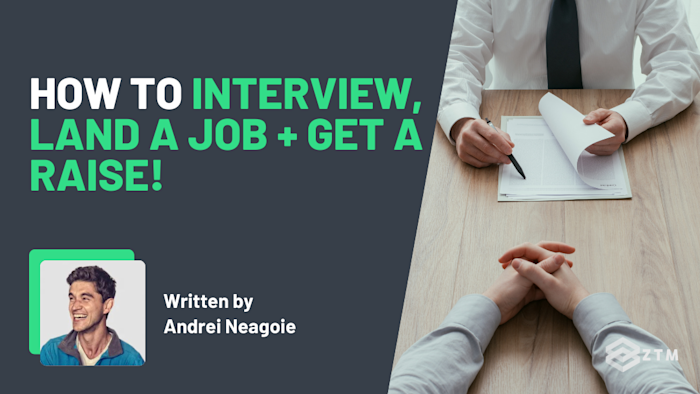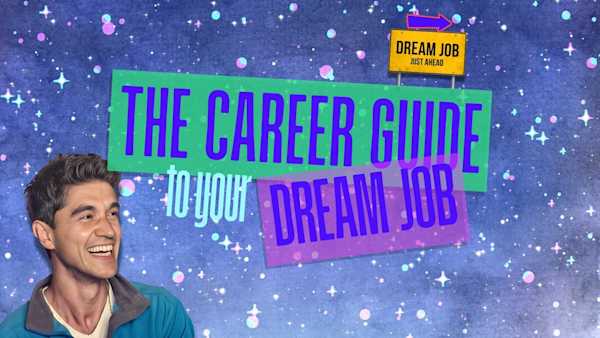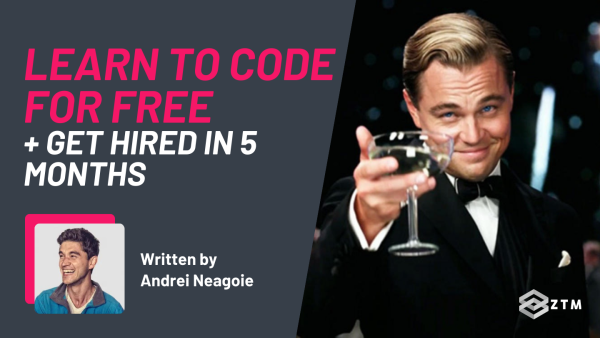Want to get hired in tech but not sure how?
Well good news! In this guide I'll cover everything you need to know about:
The interview process
How to get multiple job offers
And even how to get a raise within your first year!
In fact, it's the EXACT same method that I used to teach myself programming and receive multiple job offers in less than 6 months!
So let's dive in...
Sidenote: Want to fast track this and get hired even faster? Check out my brand new course on how to land your dream job!
This course teaches you how to stand out in any industry, get more interviews, ace them with confidence, and negotiate the best job offers. Learn proven strategies to boost your career today. It's basically the video version of this guide with step by step actions and some added details for how to ace this even further in 2026. That way you can just watch and follow along.
Check it out via the link above.
Otherwise, keep reading and let me explain my journey and what helped me get hired, so you can do the same.
What makes you the expert?
Hi my name is Andrei, and I'm the founder of Zero To Mastery. I've worked in tech for years and have taught tens of thousands of people how to also get hired in different roles.
My approach is a little different to most in that I like to focus on the most important tasks to get things done. This frees up time but also improves peoples chances. It's the exact same approach that I followed when I first got into tech.
I taught myself to code by focusing on the most important areas to learn that were in high demand
I got hired after less than 6 months of deciding to start to learn
I only applied to 20 jobs total, over a course of 3 weeks
I was able to receive multiple offers for non junior level positions
I also received a raise 6 months into the job (and another one 6 months later)
It sounds impressive because it is, but the reality was that these things didn’t just happen. They were the result of calculated tactics.
Here's how I did it, so you can do the same...
Step #1. Getting the interview
As I mentioned in my learn to code for free article (which is Part 1 in this series), you need to have a nice looking portfolio website or an active GitHub account to help you get hired.
It doesn’t have to be anything revolutionary, as most of these websites will only be visited by non-technical recruiters or HR people. You just need enough to make you look like you know what you are talking about.
If you still don't have a nice active GitHub account, you can follow the steps in the video below to get setup and create a nice looking profile in under 20 minutes:
Resume
Resumes are the bane of everyone’s existence. Nobody likes writing them and no employer offers a job solely based on somebody’s resume. So you need to treat it accordingly, as a way to get interviews.
And you will soon see that it’s not the only way to get interviews.
Here's some quick tips:
Make it one page. Make it concise
Spend a very small amount of time on your resume (no longer than 1 day)
Save time by using a resume template like this. This way you can then customize the template and reuse it quickly
Look at a few job descriptions of jobs that you want and then make sure that the common characteristics mentioned in these postings are included on your resume.
Make sure to also include skills and experience that they want. This is vitally important in today's climate with AI being used to filter resumes before being sent through the first stage. Even if you cover them more during the application elsewhere, try to keep them on the resume also so that it ticks the AI's boxes
Finally, make it slightly personalized for each position you apply to by including the employer’s name on the resume. It will take you 10 seconds, but it already puts you above most people that just send mass amounts of resumes
Sidenote: Want even more tips? A ZTM graduate who got hired by Amazon provided his top 6 tips to improve your developer resume that you can check out below:
You can also check out fellow ZTM instructor, Dan Schifano's advice on resumes and branding here.
Update your LinkedIn profile with the skills that you have and customize it according to the jobs you are targeting. Then be sure to add your resume as well.
Recruiters will use LinkedIn to look for candidates and they will use the built-in filters to make their life easier. Give yourself the best opportunity to be found.
Fun fact, but if you have listed skills that are in demand (ex. JavaScript, Node.js, React, Angular, etc.), you will even have these recruiters regularly messaging you for opportunities.
Recruiters also use filters for users who have recently changed their profiles since this signals to them that this person is looking for a job. Therefore, try and update your LinkedIn profile every two days during your job outreach. This can be as simple as changing one word.
Lastly, make sure to include a link to your portfolio website and/or GitHub. This is another easy filter recruiters use to prove to themselves that you're the real deal since realistically anyone can add any skills to their profiles simply to game the system. Recruiters know this and don't want to waste their time.
So make it easy for them to confirm you actually have the skills they filtered on.
An alternative to resumes
The above methods are pretty basic, so let’s get creative.
Instead of sending your resume, I usually email a company I am interested in working with (you can use free tools like Email Hunter or Clearbit Connect to figure out email addresses of most people).
Don’t just email them your resume though. Instead, send them your personal website and tell them why you want to work at their company. Even better, tell them how you can be an asset to them. Make the email short and concise. Then, end the email by asking them if you can come by for an interview.
You can also try sending this email to the head HR person or someone who is a gatekeeper (meaning someone who is likely the first step of the interview process). Using tools like LinkedIn, you will be able to easily find who this person is in the company.
Why do this?
It shows you're a go getter. One of the worst parts of hiring people is filling out all the information for roles, and then trying to find people. If someone who is a clearly great fit is actively asking, that can stand out.
An even better alternative
You can also try messaging lead developers or CTOs at companies that you are interested in and let them know your interest in getting to where they are professionally. Ask if you can take them out for coffee or come by the office to chat with them about their careers.
Never explicitly ask them for a job. Instead, ask them questions like:
What have been the biggest lessons you've learned to get to where you are today?
What separates a good developer from a great developer?
What advice would you give to yourself if you were starting from scratch again today?
What are the key characteristics and/or skills that you look for when hiring developers for your team?
You get the idea. And at the end of the conversation, ask them if there is anybody else that they could recommend you speak to.
In these meetings, make sure to really emphasize that your #1 goal is to find somewhere that you can learn as much as possible by working alongside smart developers.
Even if they aren't looking to hire right now, they might direct you to someone that is or remember you when they are looking to hire in the future.
The best alternative
Message CEOs and ask what technical problems they are having. Tell them what technologies you are an expert in (by this point you should know whether they require people with your skills) and ask them to let you solve a real life problem that they have free of charge. They can keep the work and in return all you ask for is an interview.
There is really no better way for you prove yourself.
TL;DR
My biggest takeaway is this: Don’t ever just send mass amounts of resumes. Find the jobs that you want, personalize your emails and try to avoid sending a resume (at least initially).
You'll be blown away at how well this works.
Also, try to bypass the formalities of an application process by getting an interview right away. Right before the interview starts, they will likely ask you for a resume, but by that point you have already gotten what you needed... the interview.
Once you have the interview, your resume is almost entirely irrelevant. It's now all about you and how you come across and how you're able to convince them you'll be a great asset to them.
This is where you have the chance to prove your knowledge and desire to work hard.
Step #2. Passing the interview
There's a lot of great information on this topic, so rather than add to it here - here are some of my favorites to check out:
These are some of the best advice I have seen. I would only add a few quick points.
Before the interview
Do some research on the company you are interviewing at, and on the people who are interviewing you. If you don't know who will be interviewing you, ask the person who has been arranging the interviews. Use this information to prepare thoughtful, specific questions to ask to demonstrate your curiosity
Prepare answers ahead of time to the questions that you are almost certain to get asked: "Tell us about yourself", "Why do you want to work for {{Company_Name}}?", "What sets you apart?", etc.
During the interview
You are using the interviewer’s time, so don’t make this a boring meeting. Bring the energy and have a two way conversation with them.
They don’t want to be sitting with a scared interviewee that is low energy, answering their questions like a robot and can’t hold an actual conversation.
Prepare a final closing argument. Most people get intimidated my interviews and especially technical ones. However, the first and last impressions are what most interviewers remember. Start the first interaction with high energy and politeness.
At the end, no matter how well the interview goes, give them a memorable closing argument. Make sure it touches on all of these points:
Don’t overuse the word “I”
Talk about the interviewer
Express to them how much better you are than everyone else
Be humble but confident
For example:
Well thank you for your time. I am sure you have lots of candidates to meet but I wanted to say one last thing: there are no shortages of developers for you to interview.
However, there is a shortage of good, hard-working, talented, egoless, developers with an ambition to learn. The best developers aren’t the ones that know the language inside and out at the expense of having blinders. It is not the ones who are unable to admit they are wrong.
I may not be the most experienced developer that you will interview but the one thing that I can guarantee is that there is nobody that you will interview that will work as hard to develop his/her skills every day, play nicely with other developers, and isn’t so narrow minded in problem solving that he/she isn’t willing to try new novel ideas.
When you hire me, you won't ever see the same mistake twice, you won't have someone afraid to ask questions, you won’t have to micromanage me, and in one year, I will be one of your most valuable employees.
I am at a point in my career where I want to be surrounded by a team that I can grow with and I have chosen {{Name_Of_Company}} for this specific reason.
You have probably had a similar experience in your career when one company allowed you to really have an impact. I am at that stage now and I look forward to being part of this team. Thank you!
You might think that sounds a little intense, but who would you hire?
A developer who did fine in the interview but blends in with all of the other interviews you have done?
Or the developer who clearly demonstrated that they wanted it more than any of the others?
After the interview
Always write a personal email to each of the people who have interviewed you within 24 hours.
Thank them for taking the time to interview you and that meeting with them simply re-enforced how much you are looking forward to being part of their team
If there were any technical challenges that you couldn’t answer during the interview, let them know that you have looked at the problem and this is the solution (hopefully you were able to figure it out by this point in the comfort of your home and google).
Ask them when you should expect an answer
Step #3. How to get multiple job offers
The day before they are supposed to give you an answer, or a day after your interview, call the HR person who has been organizing the interviews.
Let them know that you have received another offer (I never advocate lying, so only do this if it is true) and ask if there is any way that your offer can be expedited since you would prefer to work at their company, but you also don’t want to shoot yourself in the foot and miss out on the other opportunity.
Sneaky? Maybe a little bit. But the fact that other companies are interested in you means that they are not crazy to think to hire you. It’s psychology 101: social proof.
Using all the strategies above, you should be able to leverage multiple job offers.
Let's look at a few psychological techniques used here:
You have associated yourself as a determined and ambitious developer during your interview
You showed that you came prepared by asking good, thoughtful questions
You have left a strong impression at the end of the interview
You are polite and followed-up afterward to show you really want this job
And finally, other companies are interested in you. Just like in dating, knowing that others want you, makes you more desirable
Will this always work? No. But it works almost flawlessly if you execute it right. These methods will give you the best odds of getting the job.
It may be a little unconventional but it can also help you avoid the inefficiency of mass emailing resumes, and instead focus your attention on the 20% that really matters...
Getting more interviews, more quickly by avoiding the typical, boring application + resume combo
Mastering the interview process itself (before, during and after) so that a higher percentage of interviews lead to job offers
Bonus ideas to get more interviews
Spend a few weeks attending meet-ups in the industry and talk to people who are hiring.
Usually there are a lot of HR recruiters at these events so you can ask them or even developers working at the company who are at the event if their company is hiring. You can also ask for some insights into what makes candidates stand out during their interview process.
Network with other developers.
Since there is such a high demand for developers, most companies now offer referral bonuses to their employees so use this to your advantage to get other developers to introduce you to their company. It can be a win-win for both of you!
How to get a raise after 6 months
This assumes you are a good employee and developer and you are a contributing part of the company.
At the end of the day, nobody will promote you or give you a raise if you aren’t constantly learning, improving your skills and delivering value to the company (in your case, writing quality code, helping others, etc). There is no easy way around it.
During your first 6 months, make sure to keep a list/folder with:
All of the good things you have done for the company: problems you have solved, money you have saved, great comments and/or feedback you have gotten from clients/coworkers
A list of all the skills you have acquired and an outline of what you plan to accomplish in the next 6 months
Clear comparison of your skill level from your first day on the job to the 6 month mark
Write a one page letter using all of this information you've collected. Make sure to provide clear examples as well. Once you have this letter ready, ask to meet with the person in charge of making your salary decision. Whether that's your direct manager or an HR person.
During this meeting, show them how much you have grown already in only the first 6 months by summarizing what you've included in your one page letter, tell them how much you love the company, and how much you look forward to the future.
Then provide the person with your one pager letter and tell the person that based on all of these factors, you strongly believe that your current salary no longer reflects the value you are bringing to the company and that you'd like them to strongly consider increasing your salary to $X.
Ask for a salary level a lot higher than you want (think $10,000 more than you want). Most likely they will meet you in the middle, and this will make their ‘middle’, your actual ideal number (before you added $10,000).
This may sound very blunt and ‘disruptive’, but don’t fret. If both the employer and employee respect each other, this is a normal conversation that should be happening. After all, look at all the good you have done for them.
It is very expensive for companies to hire and train new developers. In contrast, you are already established and have integrated into the team. The cost of losing you and hiring a new programmer is way higher than giving you a raise.
Conclusion
There are some bold moves here, but I am a big fan of the old saying that if you never ask, then the answer is always no.
You should definitely value yourself. Most importantly, you should value the fact that you are giving your most precious resource (time) to an employer.
Make the right choice when selecting employers. It is as much about what you want as it is about what they want. Work for a company that respects your time. Otherwise why would you want to be there?
After 5 months of learning to code (plus 1 month of travel), I was able to get multiple generous offers. I ended up choosing a position that allowed me to grow the most and be surrounded by the best developers.
After 6 months, I was able to get a raise, and now I am receiving multiple offers for 6 figure positions.
Am I that good? No… there are plenty of people, smarter and more skilled than me.
However, that is only one part of the equation. If you are not able to market yourself, ask for things, and be smart about your strategies, you are missing out.
Good luck in your journey, whether you are studying to be a programmer, or you're a programmer looking for a job. Hopefully these posts have helped you.
One last thing
I've created a number of online courses and I strongly believe these courses are better than any coding bootcamp (and much more affordable) or any other online course out there.
And the testimonials speak for themselves:
If you're struggling to get hired and need more help with the technical interview, you check out my Coding Interview Bootcamp.
The best part about Zero To Mastery is our private community of thousands of students & developers who are also going through the courses and helping each other out every day.
Or maybe you just want to support my work by taking some of my intermediate and advanced courses once you use this guide to get hired 🙂.
Don't forget to get your company to pay for it. This is another perk of getting hired as a developer... most companies will give you a "learning budget" that you can use to keep developing your skills!
All articles in this 3-part series
Part 1: Learn to code for free & get hired in 5 months. Full step-by-step guide to go from complete beginner to becoming a web developer
Part 2: The Roadmap From Junior to Senior developer. Seriously, don't be a junior developer. These are the steps and topics to learn to become a senior developer
Part 3: How to Interview, Land a Job, and Get a Raise. The strategies and tactics I used to get multiple job offers after following the steps in this guide. (And the article you're currently reading)
Best articles. Best resources. Only for ZTM subscribers.
If you enjoyed this post and want to get more like it in the future, subscribe below. By joining the ZTM community of over 100,000 developers you’ll receive Web Developer Monthly (the fastest growing monthly newsletter for developers) and other exclusive ZTM posts, opportunities and offers.
No spam ever, unsubscribe anytime
These days, my full-time job is to teach people to code, get hired and advance their careers in the most efficient way possible as the Lead Instructor of the Zero To Mastery Academy. You can see a few of my courses below or see all of our courses by visiting the courses page. All updated for 2026.









